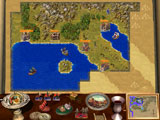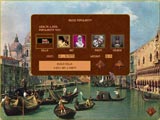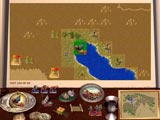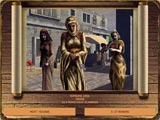 I
consider myself to be a relatively intelligent man. I read, I play
chess and monopoly from time to time, am capable of doing arithmetic,
and occasionally listen classical music. I even pretend to be able to
tell the quality of the wine at a restaurant by smelling it and
examining the cork. So when it takes me days to figure out exactly how
to efficiently play a game, I assume it’s because the game is hard
to learn. And Merchant Prince II has a learning curve that reminds me
of a very tall mountain at the start of a hike: you can see where you
want to go, but you’re not getting there without a whole lot of
work. A brilliant game at its heart, compelling and flexible, Merchant
Prince II would have been a near masterpiece in the strategy
realm if not for its clumsy interface and rocky implementation. In
short, it’s a good game, but hard to get into. I
consider myself to be a relatively intelligent man. I read, I play
chess and monopoly from time to time, am capable of doing arithmetic,
and occasionally listen classical music. I even pretend to be able to
tell the quality of the wine at a restaurant by smelling it and
examining the cork. So when it takes me days to figure out exactly how
to efficiently play a game, I assume it’s because the game is hard
to learn. And Merchant Prince II has a learning curve that reminds me
of a very tall mountain at the start of a hike: you can see where you
want to go, but you’re not getting there without a whole lot of
work. A brilliant game at its heart, compelling and flexible, Merchant
Prince II would have been a near masterpiece in the strategy
realm if not for its clumsy interface and rocky implementation. In
short, it’s a good game, but hard to get into.
MPII is a turn-based strategy game
based around the Merchant Princes of the Renaissance. You
assume the role of a Merchant Prince, a person in control of vast
resources, a devious mind, and a desire to make a tremendous profit in
any way necessary. The concept for the game has been around for some
time. The original release of the Merchant Prince was a very popular
game on older systems, and now, as sometimes happens with good games,
its age is beginning to show as computer technology moves onward and
high performance game machines like the X-box enter the market. You control mainly trade and some military units on both
land and sea as you establish trade routes, manage your resources, and
battle for popularity amongst other merchant princes.
 Ultimately,
my primary complaint is that the game is confusing. Even in the
simplest of modes, with the technology tree turned off and
automatically handled for you, it is difficult to figure out exactly
what is going on. At the beginning of the game when you only have a
few trade units running back and forth, the system is manageable. But
as your empire grows, which it must do if you wish to do well in the
game, you soon find yourself overwhelmed. As you become more
accustomed to the trading system, deciding what to sell when and
where, you establish automatic trading routes. However, I found this
system, while vital to the game, to be poorly implemented. Units would
mysteriously lose their trade route without informing me, and I would
find them sitting blissfully out in sea four turns later, empty of
cargo, with the storage units at the cities it was servicing backed up
and automatically turning away my traders. Other flaws in the system
compounded my frustrations. For example, when pirates attack a unit,
or one is hit by a storm at sea, you are informed that unit 43 met
with an ill fate. However, it does not tell you how many units you
lost, or more importantly, what their cargo was or where they were
going. If you’re like me and identify your units not by their number
but by what they are carrying and their trade routes, you find
yourself searching the world for your missing ship. This is made more
difficult by the fact that the screen does not scroll smoothly, but
instead in a staggered pattern that has you constantly moving your
mouse back and forth against the edge of the screen. There were
several times that I lost units and never figured out where they had
ever been. Ultimately,
my primary complaint is that the game is confusing. Even in the
simplest of modes, with the technology tree turned off and
automatically handled for you, it is difficult to figure out exactly
what is going on. At the beginning of the game when you only have a
few trade units running back and forth, the system is manageable. But
as your empire grows, which it must do if you wish to do well in the
game, you soon find yourself overwhelmed. As you become more
accustomed to the trading system, deciding what to sell when and
where, you establish automatic trading routes. However, I found this
system, while vital to the game, to be poorly implemented. Units would
mysteriously lose their trade route without informing me, and I would
find them sitting blissfully out in sea four turns later, empty of
cargo, with the storage units at the cities it was servicing backed up
and automatically turning away my traders. Other flaws in the system
compounded my frustrations. For example, when pirates attack a unit,
or one is hit by a storm at sea, you are informed that unit 43 met
with an ill fate. However, it does not tell you how many units you
lost, or more importantly, what their cargo was or where they were
going. If you’re like me and identify your units not by their number
but by what they are carrying and their trade routes, you find
yourself searching the world for your missing ship. This is made more
difficult by the fact that the screen does not scroll smoothly, but
instead in a staggered pattern that has you constantly moving your
mouse back and forth against the edge of the screen. There were
several times that I lost units and never figured out where they had
ever been.
 Surprisingly,
though, despite the difficult, outdated interface, Merchant Prince II
is a fun game. Sure, it’s not the sort that people gather around
during parties to play--let the consoles have those games--but it does
have the intellectual appeal often associated with Talonsoft, the game’s
publishers. After you manage to hurtle the cliff that is MPII’s
learning curve, you begin to understand exactly what the game is
about, and why the original was so popular. As you come to better
understand the game, your empire grows, you begin to make money, and
you gain an immense amount of satisfaction from finally wrestling the
monster to the ground and getting it under control. It’s sort of
like those magic eye posters. It takes a lot of work to figure it out
for the first time, but when you do, from then on you can’t help but
stop to look at one when you see them hanging in a store window in the
mall. Surprisingly,
though, despite the difficult, outdated interface, Merchant Prince II
is a fun game. Sure, it’s not the sort that people gather around
during parties to play--let the consoles have those games--but it does
have the intellectual appeal often associated with Talonsoft, the game’s
publishers. After you manage to hurtle the cliff that is MPII’s
learning curve, you begin to understand exactly what the game is
about, and why the original was so popular. As you come to better
understand the game, your empire grows, you begin to make money, and
you gain an immense amount of satisfaction from finally wrestling the
monster to the ground and getting it under control. It’s sort of
like those magic eye posters. It takes a lot of work to figure it out
for the first time, but when you do, from then on you can’t help but
stop to look at one when you see them hanging in a store window in the
mall.
It’s only after you become
comfortable with the trade systems that you progress on the
complicated stuff. One of the game’s strengths is its variety of
options. No one could accuse Merchant Prince II of not being well
thought out on a conceptual level, and it shows. MPII allows you to
adjust how often storms and pirates strike, how long the games last,
the difficulty and style of the computer AI, realistic or randomly
generated world maps, historical scenarios, as well as other aspects
of the game. This adds a tremendous amount of replay value to the
game. The most important adjustable feature to the game play itself is
the ability to turn the tech-tree on or off. This means that either
you start with access to the most advanced ships and units, or that
you have to pay for them as the game progresses. After you’ve
mastered the trading aspects of the game, turn on the tech-tree and
tackle the next wall of the learning curve game.
 Politics
exist all throughout the game. Cardinals are bought and paid for,
senators are hanged for treason, ect. You can gain power by bribing
the right people, saying the right things, and throwing the right
parties. If you like, it can largely be ignored. But in the games
where you wish to explore the intimate details and depths that MPII
has to offer, you have to understand the intimacies of the ruling
mind. I still haven’t figured it out, myself. By bribing senators
and buying cardinals you can ultimately buy your way into the office
of Pope or Dodge, the rulers of the land. With that election comes
special abilities, money, power, and so on. But I found that despite
throwing the right parties and spending the right money, I still didn’t
do so well politically. With a popularity of 95%, I would lose four
cardinals a turn to assassination, and at least one senator to
treason, which is an offence punished by death. That was a lot of
money wasted for little apparent gain, not to mention the amount of
money I threw away getting the 95% popularity. All in all, I found the
political system more trouble than it was worth, but it does go to
show exactly how much depth the game has in its heart. Give me some
time, and I’m sure I’ll be able to figure the political system
out, and then I’ll be having a great time there, too. Politics
exist all throughout the game. Cardinals are bought and paid for,
senators are hanged for treason, ect. You can gain power by bribing
the right people, saying the right things, and throwing the right
parties. If you like, it can largely be ignored. But in the games
where you wish to explore the intimate details and depths that MPII
has to offer, you have to understand the intimacies of the ruling
mind. I still haven’t figured it out, myself. By bribing senators
and buying cardinals you can ultimately buy your way into the office
of Pope or Dodge, the rulers of the land. With that election comes
special abilities, money, power, and so on. But I found that despite
throwing the right parties and spending the right money, I still didn’t
do so well politically. With a popularity of 95%, I would lose four
cardinals a turn to assassination, and at least one senator to
treason, which is an offence punished by death. That was a lot of
money wasted for little apparent gain, not to mention the amount of
money I threw away getting the 95% popularity. All in all, I found the
political system more trouble than it was worth, but it does go to
show exactly how much depth the game has in its heart. Give me some
time, and I’m sure I’ll be able to figure the political system
out, and then I’ll be having a great time there, too.
When it boils down to it, it is amazing
that Merchant Prince II manages to be such an enjoyable game with the
blocky and flawed interface, yet it is. MPII is a very enjoyable
experience once you grow accustomed to the system, and the replay
value is excellent. The game has the ability to generate a completely
random map each time you play, allowing you to explore and discover
all over again each time you fire it up. The thrill you get when you
discover a new city, and new trade options, is up there with the best
of them. The Multiplayer ability allows up to four players on a
network to play at once. The play by e-mail feature is an excellent
one, though long (an average game lasts over 100 turns), and adds
additional appeal to the game, especially to those of us preparing to
go on vacation for the summer. If you like resource management games,
and don’t mind the little bit of time, or lot of time, it takes to
learn the system, Merchant Prince II is a solid game for your money.
Just make sure you have a good pair of hiking boots and enough time to
play a few practice games.
Aaron
Stanton |
